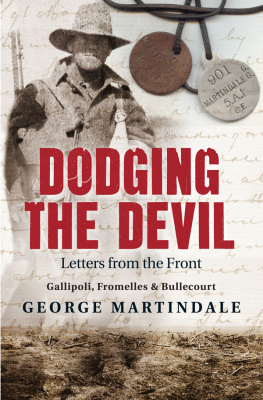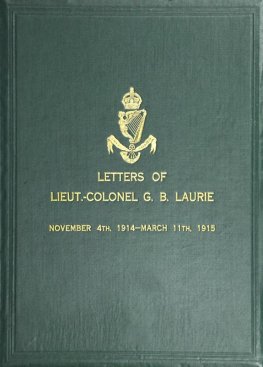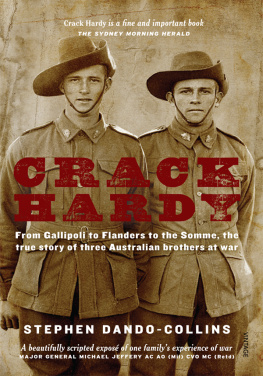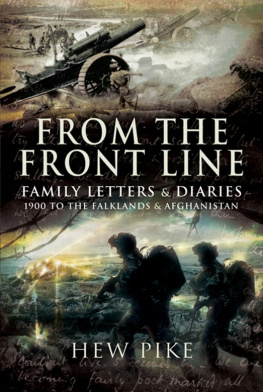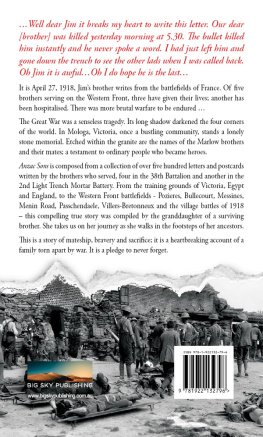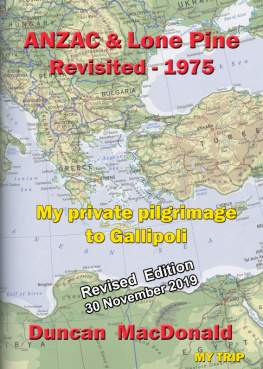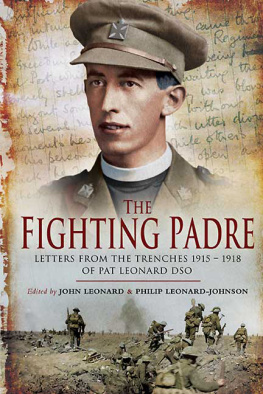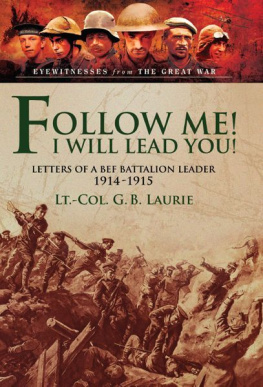Normanby, Dimboola, late 5th Batt., A.I.F., who passed away April 1, 1922.
A true friend.

Private George Martindale (centre) in a photograph taken by Captain Charles Bean (war correspondent) in May 1915 on the Gallipoli Peninsula. (AWM G00963)
I suppose the censor will not pass this letter, George Gowthorp Martindale wroteto his father, because there is too much truth in it. Corresponding from Egyptin January 1916, George was a long way from his hometown Dimboola, in western Victoria,and had passed through one of the great moments of his nations history. A few monthslater, when Anzac Day 25th April came round again he and only one other man inhis company stepped forward when an officer asked for those who had been at the landing.Certainly a quieter day than last year, George quipped to his father.
George might have become one of the great writers of twentieth-century Australia.Landing on the Gallipoli Peninsula at Anzac Cove on 25 April 1915, fighting LonePine, enduring Fromelles, and suffering Bullecourt, Georges war experience reflectssomething like a litany of the nations hallowed trials during the Great War. Certainly,George described some of these actions for members of his family in the letters hesent home, forming a collection of his writings that is the basis of this book. Butunfortunately, Georges literary output remains incomplete. Unlike a fellow veteranof D Company in the 5th Battalion, Albert William Keown, who wrote and publisheda history of the war in the years following its end, George suffered and lingeredand died in its wake. Georges diary, which he kept during the conflict, is lost.Other letters, to which he makes reference in those that survive, are, at best, dispersed.And the inbound correspondence from home, which he said he treasured while in thedugouts and trenches, and which served as his greatest inspiration, largely wentthe way of his diary. In the confusion following his unconscious evacuation fromthe front his letters and writings were, perhaps appropriately, most likely lostto the contested earth in the general neighbourhood of no mans land.
Yet not all was lost. Fittingly, his words survived in Dimboola, where his motherand father and sisters and brothers read of his adventures and tribulations. Theypassed the pages between them, and wrote back to George in turn. The Martindale familyconversed across oceans and continents, months and years. In doing so, they produceda history from the war like no other. It was a time that was not just about warriors.It was about chickens in backyards, local gossip and shire politics, the weatherhere and there, meeting old mates in foreign locations, and of course the many sacrificesthe war demanded and the people endured. All of this, in its complexities and contradictions,George articulated with a distinct style. His expression was both indicative andunique, capturing and challenging the prevailing zeitgeist. His frames of referenceoften diverged, as he strived to embody certain characteristics of Australian soldiery,while also criticising the falsehoods of a deliberately fostered national mythology.He expressed antipathy towards the Hun, but sent kind wishes to the old Germansettlers back home. He read the Koran, quoted the Bible, enjoyed poetry and slaughteredhis foes. Before he was a name on a plaque or part of a collective legend he wasa son, a brother, an uncle, a friend, a discerning observer, a witty companion anda compelling correspondent.
War has been declared against all surplus stock & usual prices, advertisement heading from Dimboola Banner, 25 August 1914
George signed his Attestation Paper for Persons Enlisted for Service Abroad onFriday 21 August 1914. He recorded Footscray as his birthplace, gave his age astwenty-seven years and five months, and affirmed he was a natural born British Subject.Standing over five feet and six inches tall, George had brown hair, blue eyes anda florid complexion. The unmarried carpenter recorded that he belonged to the Churchof England and put his mother down as his next of kinMrs Martindale of Dimboola,Victoria.
Electoral records reveal that George was living in Brighton for at least some ofthat year, working as a carpenter. This is why his attestation was initially completedin South Melbourne. Once preliminary information was gathered he was examined bya medical officer and formally appointed to the Australian Imperial Force, 5th Battalion,H Company. George was given a service number901and the rank of private. The wholeprocess was completed that day.
Within a few days Georges enlistment was public news in his hometown, courtesy ofthe Dimboola Banner and Wimmera and Mallee Advertiser. Another volunteer for theexpeditionary force who has been accepted, the paper noted is Mr George Martindale,of Dimboola. The Dimboola Banner recorded the collective enthusiasm of a town hecticwith recruitment fever. There had been a great deal of patriotic fervor displayedfor Dimboola recruits as they headed off for service in small batches. Only on Thursdayevening, the day before George signed up, the local recruiter had arranged a socialgathering at Howards Hotel for the third contingent of Dimboola men. During thenight the king was toasted, speeches were given and applauded, and the mood was generallyvigorously patriotic. Then towards the end of proceedings Captain Crebbin, the recruiter,stood up and turned to the volunteers.
Now, lads, you are leaving your mothers, your fathers, your sweethearts, your sisters,and your brothers. On every opportunity that you get, write to them. You will bein the midst of excitement. They will be waiting anxiously and looking for news fromyou. Write loving words to them. They may not see you again, although I hope thatthey will. You may depend upon it that they will hand those letters around amongtheir friends, and that they will be read with interest.
Then the night drew towards its end. The party continued a little while, before themen were escorted to the rail-way station by a large crowd, who sang patriotic songs,and shouted them hoarse in their enthusiasm. The ten volunteers boarded the expresstrain, scheduled to depart from Dimboola at 2.18 am, and headed towards their trainingcamp at Broadmeadows in outer suburban Melbourne. Whether this was the turning pointfor George he never revealed, but the timing is at least suggestive. More likelyhe was still in Brighton and missed much of the Dimboola pageantry. But the factthat the event was chaired by Mr R MartindaleGeorges fatherprobably reflecteda wider compulsion for George. Mr Robert Martindale, Dad to George, was a prominentlocal timber-merchant, builder and plumber who had helped build much of the materialfabric of modern Dimboola. As a Justice of the Peace, Mr Martindale was also oneof the towns leaders. Georges family were therefore socially situated in the midstof a busy country town, where, sometimes working with his father as the local undertakeranotherside of the businessGeorge was well-placed to know most, if not all, of the townsmain families. He certainly knew some of the men boarding the train.
Recruitment within Dimboola was closely linked to some of the towns inner circles.Among those to first enlist, attracting much public attention as he did so, was thelocal Shire Secretary, Henry DAlton. His surname ensured prominence on the firstlists of local recruits, but so too did his social standing.In response to the adulations, Henry spoke on the volunteers behalf. He and theothers were, he said, doing nothing more than their duty in volunteering. Theywould, he concluded, do their best, and try to return to Dimboola. He and his companionswere walked to the train, and cheered as it departed. The following night, a similarparty and railway fanfare saw off another group, then on Friday George seeminglyquietly volunteered in Melbourne. It was a hectic week for the young men of Dimboola.

